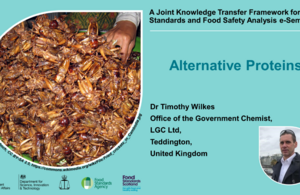E-seminar: An introduction to alternative proteins
An e-seminar produced as part of the Joint Knowledge Transfer Framework for Food Standards and Food Safety Analysis

Current global food production practices are reported to be associated with the production of high levels of greenhouse gas emissions. A recent report by the UK Committee on Climate Change indicates that at least a 20% reduction in the consumption of animal and dairy products would be necessary for the UK to achieve its target net-zero carbon emissions by 2050. Switching to sustainable, alternative dietary protein sources is one strategy that would reduce the impact of food production practices on the climate.
This E-seminar will provide the viewer with a brief introduction to the leading alternative dietary protein sources, and the scope and limitations relating to each one, as well as any health and safety concerns.
This e-seminar has been produced as part of the Joint Knowledge Transfer Framework for Foods Standards and Food Safety Analysis.
This Framework is funded by: the Department for Environment Food and Rural Affairs (Defra), the Food Standards Agency (FSA), Food Standards Scotland (FSS), and the Department for Science Innovation and Technology (DSIT) via the Government Chemist programme, and is aimed at disseminating knowledge from government funded research to stakeholders, to support UK laboratory capability, and promote best practice in food safety and standards analysis.